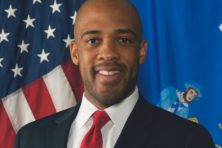U.S. Senate Seat: Ron Johnson vs. Mandela Barnes
- Share
- Tweet
- Pin
- Share

The Nov. 8 election is a little more than two weeks away, and we’re wrapping up our coverage of the candidates with the race for the U.S. Senate seat currently held by Republican Ron Johnson and challenged by Democrat Mandela Barnes, Wisconsin’s current lieutenant governor.
It’s considered to be among the most crucial and competitive races in the country on a short list that includes Arizona’s U.S Senate race between former astronaut and Democratic Sen. Mark Kelly and Republican candidate Blake Masters; and Nevada’s U.S. Senate seat battle between Republican candidate Adam Laxalt and Democratic Sen. Catherine Cortez Masto.
In the Wisconsin race as of the last financial report filed Sept. 30, Johnson had raised $28.93 million to Barnes $26.17 million, according to Open Secrets, the nonprofit, independent research group that tracks money in U.S. politics and its effect on elections and public policy.
We strove to bring you the words of both of the candidates for the Wisconsin seat. We reached out to Johnson directly and his staff, with no success. We also enlisted the help of the local Republican Party. Stephanie Soucek, chair of Door County’s GOP, was kind enough to forward our questionnaire to her contacts in Johnson’s office. Still no response.
These questionnaires are an opportunity for candidates to reach their constituents with their own, unmediated words. It’s unfortunate we can’t give you Johnson’s, but you will find Barnes’ answers below.
First, a bit about Barnes, age 35. He’s a Milwaukee native whose father was a GM factory worker and mother a Milwaukee school teacher. Prior to being seated with the governor in 2018, Barnes was elected in 2012, at the age of 25, to serve in the Wisconsin Assembly, representing the 11th District, located within north-central Milwaukee County. He served until 2016, when he resigned to make a primary challenge for the Wisconsin Senate seat for the 4th District. He lost that challenge and then went on to run for lieutenant governor.
Barnes chairs the Governor’s Task Force on Climate Change and serves on the Governor’s Health Equity Council, Wisconsin Criminal Justice Coordinating Council, Wisconsin Missing and Murdered Indigenous Women Task Force, and Governor’s Council on Financial Literacy and Capability.
Peninsula Pulse (PP): Why are you running?
Mandela Barnes (MB): I’m running for the U.S. Senate to rebuild the middle class and give everyone a fair shot at the American Dream. I was raised by a public-school teacher and a third-shift auto worker. Those jobs gave my parents a ticket to the middle class. That’s why I’ll never stop fighting for everyone in Wisconsin to get the same opportunities my parents gave me.
We deserve a leader who has a firsthand understanding of the challenges working families face every day and who will put Wisconsin first – not someone who supported eight of the most extreme national abortion bans, wants to put Social Security and Medicare on the chopping block, and ship our jobs overseas and out of state.
I’ll protect a woman’s right to choose and stand up to special interests to bring manufacturing and supply chains back home, to lower costs for working families, and to create jobs and end bad trade deals that hurt our family farmers.
PP: The national debt rose by 35% (from $20 trillion to $27 trillion) between 2017 and 2020, increased to $30 trillion by January of this year, and is currently at $30.8 trillion. Is controlling or lowering that debt a priority, and if so, how would you do that?
MB: My focus is ensuring our economy works for working people. For too long, politicians in Washington have prioritized tax breaks for billionaires and special interests while working people are left in the dust. I believe we can invest in working families and pay for it by ensuring that the wealthy and big corporations pay their fair share.
My opponent, Sen. Johnson, supported a tax bill that added $2 trillion to the deficit and delivered millions in tax breaks to himself and his billionaire donors. Meanwhile, he did not support an extension of the Child Tax Credit or legislation that would lower the costs of prescription drugs. I believe we should prioritize working people and middle-class families, and that’s what I’ll fight for in the U.S. Senate.
PP: Inflation ranked as a top concern for Wisconsinites in Marquette University Law School’s most recent poll in August – ahead of abortion policy, gun violence, health care and the coronavirus. What are your solutions to combat inflation?
MB: I know what it’s like to struggle to pay the bills and wonder how you’ll make the ends meet. We need to give middle-class families a tax cut, and we can pay for it by making sure the wealthiest among us pay their fair share. And Americans need a raise. Let’s raise the minimum wage and lower costs of everyday necessities.
It’s also time to crack down on oil and drug companies that are using inflation as a smokescreen to raise prices on the American people.
Finally, we need to bring manufacturing back home. When we make things at home, we don’t have to worry about global supply shortages that drive up prices. That’s how we create good-paying union jobs like the ones my dad and granddad had. This work starts by firing politicians like Ron Johnson who helped companies ship good jobs overseas and allowed prices to get out of control.
PP: In the wake of the Supreme Court’s Roe v. Wade decision that left the regulation of abortion up to individual states, does the nation need a national standard on abortion? If so, what should that standard be?
MB: Wisconsinites’ reproductive rights are at stake in this election. From supporting an abortion ban with no exceptions for rape, incest or the life of the mother to callously claiming that people can just “move” if they don’t agree with Wisconsin’s abortion law, Ron Johnson can’t hide from his out-of-touch and dangerous record. This is a decision I trust women and their doctors to make. In the U.S. Senate, I will fight to make Roe v. Wade the law of the land to ensure that women have the freedom to make the decision that is right for them.
PP: How can we pay for health care in the future? Do we need a national health care system like Medicare for All?
MB: This health care system simply isn’t working for everyone. Every American deserves affordable, quality care. I am proud to join Tammy Baldwin in support of Medicare for All, which is the quickest way to get there.
While we work to make that a reality, there are a lot of immediate steps we can take to make sure people get the coverage they need, like letting Medicare negotiate drug prices and capping insulin costs at $35.
I believe we need to strengthen the Affordable Care Act, but Ron Johnson led the charge to repeal the Affordable Care Act and voted against allowing Medicare to negotiate fairer drug prices, and has relentlessly worked to raise health care costs and rip away critical protections from Wisconsinites with pre-existing conditions.
PP: What changes are needed to extend the Social Security Trust Fund’s insolvency date of 2035?
MB: When I hear Ron Johnson threaten Social Security and Medicare and refer to Social Security as a “legal Ponzi scheme,” I think of my grandfather. He moved to Milwaukee after serving in World War II and was able to retire with dignity after working for 30 years as a steelworker.
I also think of my father, who retired after 30 years as an auto worker. He deserves the benefits that he paid into all his life – just like all of us do. Ron Johnson has no right to take that away from us.
In the U.S. Senate, I will fight attempts to weaken Social Security and work across the aisle to build bipartisan support to block any legislation that would privatize Social Security. We can ensure Social Security stays solvent for future generations by making sure the very wealthy pay their fair share. I’ll vote against measures that would raise the retirement age for Social Security, cut benefits or in any way betray our obligation to workers and retirees.



